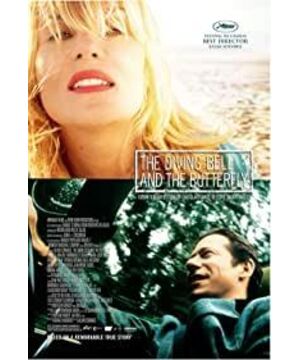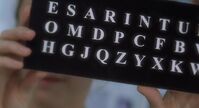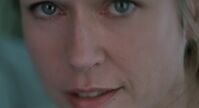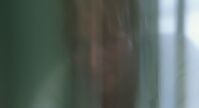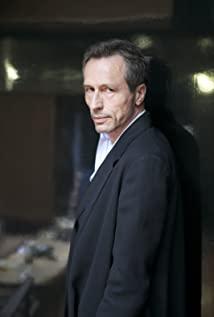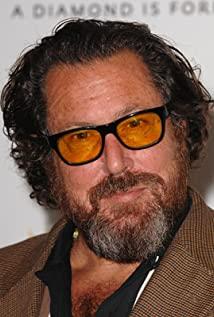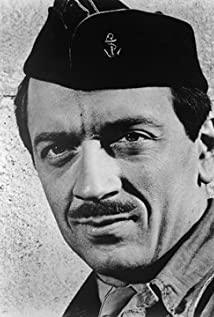In Paris, France, the sun in early winter is still warm and sunny.
You drive on the road in the outskirts, the green color is beautiful. The boy on the right is growing up and immature. That is your long-lost son. The triviality in his mouth is a kind of agility for you.
But this is only a moment ago. A moment later, you lay weakly in the pale ward, with a trance in front of you. You answered these strangers' questions in confusion and angrily, but you immediately realized that no one could hear them anymore.
You have a stroke. The left eyelid is the only muscle you can use.
You can't exercise, even if you lift your finger; you can't talk, even if your voice has become hysterical in your heart.
One blink is affirmative, two blinks are negative. This is what you can express, and this is your entire life in the eyes of others.
Jean Dominique Bobby, former editor-in-chief of the French ELLE magazine.
On December 8, 1995, 43-year-old Bobby suffered a sudden stroke.
The doctor who diagnosed him once said that falling into the trap of this disease is more difficult than winning lottery tickets.
On March 7, 1997, the French version of "Diving Bell and Butterflies" came out. In June, English edition in New York. July, London English edition. August, German edition.
This is a book that Bobby "written" with his left eyelid two years after the stroke. People from dozens of nationalities all over the world are already reading this short text.
On March 9, 1997, Jean Dominic Bobby passed away.
In 2007, director Julian Schnabel directed "Butterfly and Diving Bell", which won the Cannes Grand Prix.
Bobby said that now he is like being trapped in a heavy diving bell, tightly shrouded, and pressured to breathe, but his soul can fly around like a light butterfly, in time and Soar freely under the interweaving of space.
Diving bell...
Helpless, suffocated, angry, silent.
The diving bell sunk in deep water, the impenetrable silence contains wriggling anger.
The first time Bobby saw the world after a stroke, he only had one left eye. God didn't even give him a chance to complain, so he took everything from him. This romantic talent who was once proud in love and had a smooth career has lost everything, and the trembling image in his left eye informs his existence.
He had no way of knowing his appearance. When the doctors were pushing him through the corridor in a wheelchair, he saw the face that appeared in the mirror. The mouth is crooked and the eyes are slanted, and the lifeless face.
He screamed, oh my goodness, I was like formaldehyde poisoned. Even at this time, his lips were still turned out desperately.
Bobby lost his language. When the doctor stitched up his ineffective right eye, he protested severely, but his driving sound could only echo in the diving bell over and over again. It slowly sank, and the deep sea locked his soul. , Flesh and blood, and every inch of skin.
During the sleepless night, the off-air channel made Bobby crazy with a harsh voice. And on a clean weekend, the endless loneliness put Bobby in hell.
The beautiful language doctor taught Bobby the way to "speak"-she reads the common alphabet, and when Bobby hears the letter she needs, she blinks her left eye-this is the only thing he can do.
However, the first sentence he uttered in this difficult way was:
I want to die.
The director Julian Schnabel, who was born as a painter, interprets the film in a special way. Nearly 1/3 of the shots in the film use Bobby's blurred vision to show the entire world that he and his left eye can see-it is narrow, trembling, and blurry. In the first half of the film, this repressive perspective, coupled with the angry and desperate monologue of the protagonist Matthew Amalik, makes us feel like Bobby's body is tightly locked by the illness.
The diving bell of the deep sea, Bobby on the hospital bed, was like an extremely angry person whose mouth was forcibly gagged. He could not scream, but could only face the deep tranquility alone.
Butterfly...
Freedom, agility, delusion.
Today, it seems that I have nothing in my life, only a series of failures.
I can't fall in love with a woman, I can't seize the opportunity.
I allow it to flow through the happy moments.
I knew the result before the end of the game...
Am I stupid or blind?
Or is it that only the dazzling light of disaster can restore a person's nature?
Bobby is not a peaceful person, even in the diving bell, as long as God opens a window for him-even if it is just a left eye with blurred vision-he can still sway like a butterfly Out.
But this is not an inspirational film, but an elegant French film. The paralyzed Bobby did not have a strong desire to survive, and he never thought about making any greatness with his short-lived life system. He just used this quiet time to think and taste life more slowly, using all his memories and imaginations to set himself free.
That beautiful language physician had a sweet date with Bobby in countless imaginary scenes. Even at the beginning of the film, he in despair blurted out "Ah, I'm in heaven" when he first met her, and looked at the doctor's chest tremblingly with his left eye.
The scene of the past in memory unfolds. The father in the wheelchair, the laughing children, the loving woman. Bobby's life begins to rewind, what he once cherished, missed, possessed, and lost. Memories are a masterpiece of time, forty-three years of life reappeared in two years. He interprets himself subjectively and objectively over and over again, and when he loses his body, he gains himself, the true "I".
He can imagine anything, anyone, anywhere. Stroll with the camel team in the yellow sand dancing room, and climb the snow peak in the cold wind. He saw his favorite woman, and he kissed her on the golden sandy beach. The light waves on the side, it is the azure blue ocean, profound and profound.
Bobby's father said that Bobby was trapped in his body. But space has no meaning to the soul. Even if we can reach the moon far away, compared to the vast universe, we are still only sad life entities that are chained up. How much is the earth larger than the human body? The shuttle of thought does not require any material restrictions. With a left eye, Bobby proves his existence.
Love...
miss, hurt, wait, true love.
Bobby's favorite person never appeared.
They were romantically lingering, looking at each other sweetly and affectionately. But everything was just a phantom that happened in the diving bell. He kept repenting and reminiscing, but he couldn't see her.
"I always wait for you here, every day." The
ward fell silent, and the ex-wife Swina who was guarding the bed could no longer contain her tears.
Whose punishment was this? The innocent Sweina had to pass this sentence word by word to the woman on the other end of the phone. She took possession of what she loved, and she made her burst into tears.
"I'm always waiting for you." This is not a love sentence, but a true love that Bobby can't bury. He was deprived of the right to pretend, and every word he "said" was naked and true. He was forced to express himself so coldly, with no choice.
At the end of life, the merciless gifted man counted his heart for the last time and became the most real person.
A black man...
friend, cold, humorous, and tender.
Bringing a motorcycle toy to visit the patient, forcing a patient who could not resist to wear a fur hat like a rabbit, and forgetting to look at Bobby's left eye when reading the alphabet.
This big black man completely inspired Bobby's sense of humor, and Matthew Amalek's slightly ironic tone made us laugh with Bobby. He seemed to find it difficult to accept this Bobby with only one left eye. He could not be merciful, could not be gentle, and was a little helpless. So he comforted awkwardly, looked after awkwardly, and joked awkwardly.
He is such a lovely friend, when life is gone.
Father...
destiny, imprisonment, powerless.
After the one-hour and 47-minute movie is over, almost no one will forget Bobby's father. The old man who was paralyzed in a wheelchair and could barely take care of himself. He was equally suave when he was young, and he couldn't forget his favorites, and he was also physically imprisoned when he was old-but he was only half-paralyzed, and his son almost became a vegetative.
Bobby's butterfly once flew over his father's room. At that time, Bobby was shaving his face while eloquently talking with him.
"The doctor said that if I could live to be a hundred years old, he would give me a grand party. But I don't want to participate. Who wants to live to be a hundred years old?"
Bobby's father stood tremblingly in front of the mirror and smiled. The wrinkled old face is juxtaposed with the photo of him in his prime of life.
It was a long time after Bobby lost his life that he received a call from his father.
The same helpless old man seemed a bit incoherent. He couldn't help sobbing as he listened to the alphabet slowly read by the language doctor on the phone.
"All the thoughts rushed out of my mind.... I have an idea about us. We are in the same situation. I am imprisoned in an apartment and cannot go up or down. We are. All are chained, you are trapped in your body, and I am trapped in the apartment."
Intermittent words. A kind of affection, a kind of destiny.
Since the director Julian Schnabel is an authentic American, the film "Latent" is not strictly a French film. But wrapped in beautiful French and elegant French thinking, it is understandable to call it a French movie. However, because of this mixed identity, "Hidden" had to die in the Oscar competition for best foreign language film. In addition, despite having won four nominations for best director, best adapted screenplay, best photography and best film editing, "Latent" eventually returned from the Oscar without success.
In the much criticized Golden Globe Awards this year, the film won the best foreign language film and best director. For this result, director Schnabel smiled and said:
"It feels good to be accepted."
View more about The Diving Bell and the Butterfly reviews


